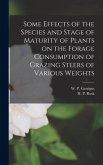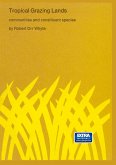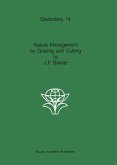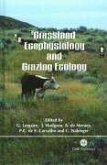Perennial forages are always in short supply or low in quality during summer because of high temperatures that favor the growth of perennial grasses in the temperate regions such as Appalachian highlands of the United States. During winter, low temperature is a hindrance to growth of perennial grasses. This book highlights the annual forages that can be grown to supplement perennial forages during summer and winter. Sudan grass and pearl millet are two annuals that can be grown in summer and winter annuals are Triticale and a mixture of turnip and annual ryegrass. Glyphosate and burning, are two methods of pre vegetation control that are compared. The study recommends use of glyphosate as a pre plant vegetation control. Sudan grass and pearl millet may be used to supplement perennial forages in summer, Triticale, and a mixture of turnip and annual rye grass in winter.
Bitte wählen Sie Ihr Anliegen aus.
Rechnungen
Retourenschein anfordern
Bestellstatus
Storno








